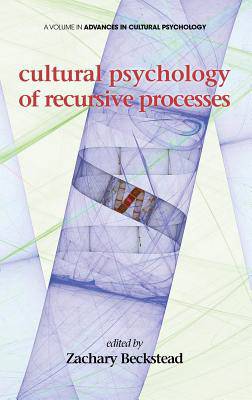
- Afhalen na 1 uur in een winkel met voorraad
- Gratis thuislevering in België vanaf € 30
- Ruim aanbod met 7 miljoen producten
- Afhalen na 1 uur in een winkel met voorraad
- Gratis thuislevering in België vanaf € 30
- Ruim aanbod met 7 miljoen producten
Zoeken
Cultural Psychology of Recursive Processes (HC)
€ 152,45
+ 304 punten
Omschrijving
A volume in Advances in Cultural Psychology Series Editor: Jaan Valsiner, Aalborg University Cultural Psychology of Recursivity illustrates how recursivity, often neglected in the social sciences, can be an important concept for illuminating meaning-making processes. Recusrivity is a fascinating though abstract concept with a wide array of often incompatible definitions. Rooted in mathematics and linguistics, this book brings recursion and recursive processes to the foreground of psychological processes. One unifying claim among the diverse chapters in this book is that recursion and recursive processes are at the core of complex social and psychological processes. Recursion is bound up with the notion of re-turning, re-examining, re-flecting and circling back, and these processes allow for human beings to simultaneously distance themselves from the here-and-now settings (by imaging the past and future) while being immersed in them. The objective of this book is not simply to celebrate the complexity of human living, but to extend the notion of recursion, recursivity and recursive processes into the realm of social and psychological processes beyond the arenas in which these ideas have currently thrived. Cultural Psychology of Recursivity shows that in spite of the difficulty in defining recursivity, self-referencing (looping), transformation (generativity), complexity, and holism constitute its core characteristics and provide the basis for which authors in this book explore and elaborate this concept. Still, each contribution has its own unique take on recursivity and how it is applied to their phenomenon of investigation. Chapters in this book examine how recursive processes are related to and basic aspects of play and ritual, imitation, identity exploration, managing stigma, and commemorative practices. This book is intended for psychologists, sociologists, and mathematicians. Use of the book in post-graduate and graduate level of university teaching is expected in seminar format teaching occasions.
Specificaties
Betrokkenen
- Uitgeverij:
Inhoud
- Aantal bladzijden:
- 276
- Taal:
- Engels
- Reeks:
Eigenschappen
- Productcode (EAN):
- 9781681230191
- Verschijningsdatum:
- 7/05/2015
- Uitvoering:
- Hardcover
- Formaat:
- Genaaid
- Afmetingen:
- 156 mm x 234 mm
- Gewicht:
- 562 g

Alleen bij Standaard Boekhandel
+ 304 punten op je klantenkaart van Standaard Boekhandel
Beoordelingen
We publiceren alleen reviews die voldoen aan de voorwaarden voor reviews. Bekijk onze voorwaarden voor reviews.










